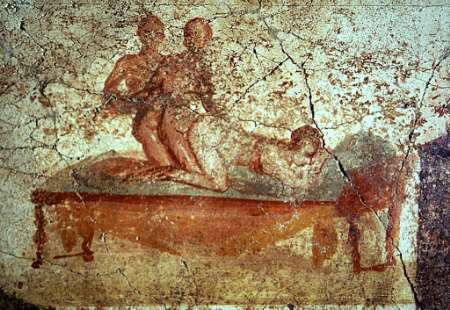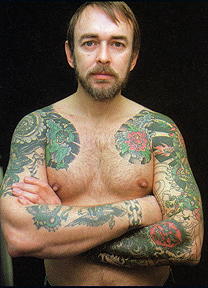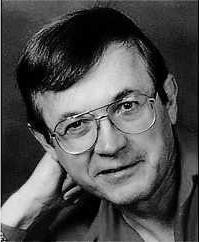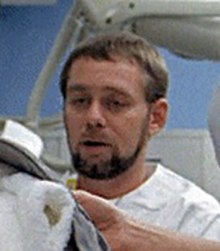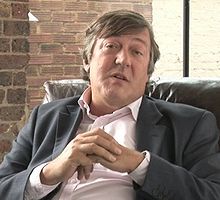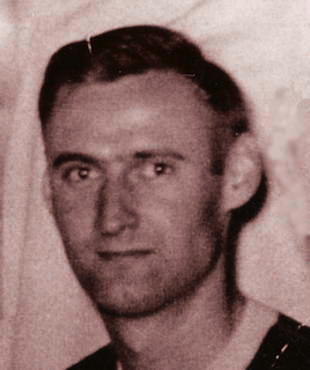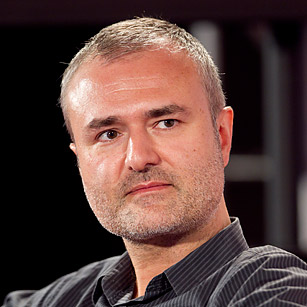|
presents THIS DAY IN GAY HISTORY based on: The White Crane Institute's 'Gay Wisdom', Gay Birthdays, Gay For Today, Famous GLBT, glbt-Gay Encylopedia, Today in Gay History, Wikipedia, and more …
Collected by Ted August 24 [{(o)}]|[{(o)}]|[{(o)}]|[{(o)}]| [{(o)}]|[{(o)}]
79 AD – Mt Vesuvius erupts burying Pompeii and preserving the city, an a macabre way fortunate, for it saved the homoerotic frescos that Christianity would no doubt have destroyed. It also saved the gay graffiti found centuries later by archaeologists. One scratching on a wall reads, "Phoebus the perfume seller fucks real good." Another reads: "On this spot Auctus copulated with Quintius." When the artwork was first discovered, people found it so scandalous that much of it was locked away in the National Museum of Naples, where it remained hidden from view for over 100 years. In 2000, the art was finally made view-able to the public, but minors must be accompanied by an adult.
1932 – Cliff Raven (d.2001) was one of a handful of artists (along with Sailor Jerry Collins and Don Ed Hardy) who pioneered the adoption of the Japanese tattoo aesthetic in the U.S. Cliff started his career in Chicago at the Chicago Tattooing Company on Belmont Street. Later, he moved from Chicago to California, where he and his brother, Bob, operated Tattoo Works—two sister studios, one in Los Angeles (now known as Sunset Strip Tattoo) which was, for years, located on the edge of West Hollywood on the famed Sunset Strip, and one in San Francisco (now defunct). Cliff was unusual in that he was an openly gay man in a profession that, at the time, was strongly homophobic (as was society at large). Cliff commissioned a gay erotic artist Rex to produce a special TattooWorks logo for the shop, which became a fairly well-known image. In the early 1980s, Cliff retired from tattooing and moved to 29 Palms, California where he ran a used/rare bookstore, Raven's Books, until his death in 2001. While retired, he infrequently continued to tattoo a select group of long-term clients, although he was largely withdrawn from the world of tattooing. 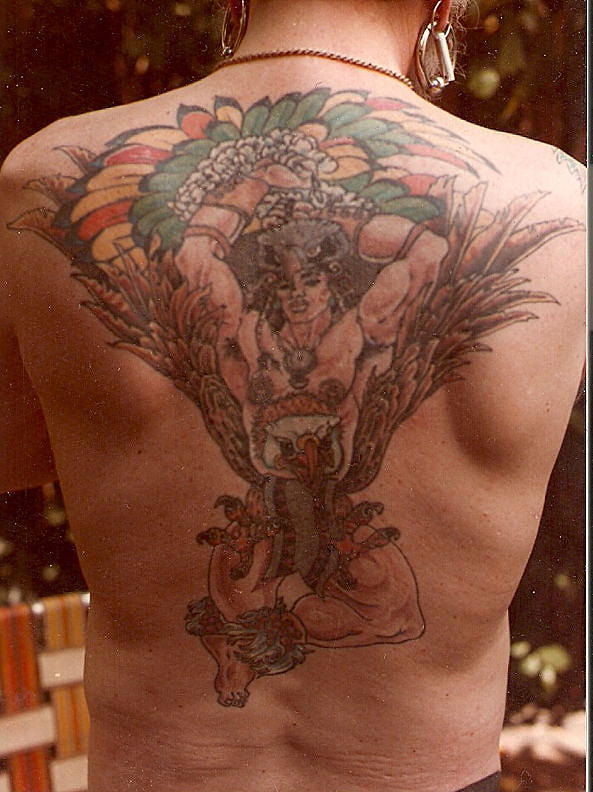 A Cliff Raven masterpiece (Click for larger) The importance of Cliff's contribution to tattooing—and particularly with respect to the gay tattoo subculture— cannot be underestimated. Cliff was a resource for many gay men who began to explore the fetishistic aspects of tattooing. Some of Cliff's work featured the first overtly homoerotic tattoo images.
1932 – In Germany, five Nazis are convicted of political murder on August 22nd. On this day, Edmund Heines, a Nazi leader, organizes a protest against their death sentence. Less than two years later, Heines is discovered naked in bed, by Hitler himself, with another man. Hitler orders Heines to be shot. Hitler’s chauffeur Erich Kempka claimed in a 1946 interview that Edmund Heines was caught in bed with an unidentified 18-year-old male when he was arrested during the Night of the Long Knives, although Kempka did not actually witness it. The boy was later identified as Heines’ young driver Erich Schiewek. According to Kempka, Heines refused to cooperate and get dressed. When the SS detectives reported this to Hitler, he went to Heines’s room and ordered him to get dressed within five minutes or risk being shot. After five minutes had passed by, Heines still had not complied with the order. As a result, Hitler became so furious that he ordered some SS men to take Heines and the boy outside to be executed.
Born in Maxville, Ontario in 1933, he grew up as a ward of the provincial Children's Aid Society after his father abandoned the family and his mother was financially and emotionally unable to care for Lee and his brother David on her own as a single mother. He was a factory worker and trade unionist in his youth, and ran as a Cooperative Commonwealth Federation candidate in the electoral district of Broadview in the 1958 election. He completed an undergraduate degree in sociology at the University of Toronto in 1956, and earned a Ph.D. from the University of Sussex in 1971. He then joined the University of Toronto as a faculty member in 1971. Teaching at the university until his retirement in 1999, he was the author of over 300 books and articles in sociology, predominantly focusing on sociological study of the LGBT community and on the broader psychology of love and sexuality. His articles appeared in publications including the Canadian Journal of Higher Education, the Journal of Homosexuality, Psychology Today, The Body Politic, Canadian Forum and Christopher Street. His most noted books were The Colours of Love (1973), the first prominent work of research into the concept of love styles, and Getting Sex (1978), a study of gay sexual cruising. In 1964, Lee began working as an "undercover gay activist", writing letters to various publications to protest unfair and biased depictions of LGBT people and writing more balanced pieces of his own. Initially undertaking this work anonymously or under pseudonyms, in 1974 he officially came out on TVOntario's The Judy LaMarsh Show, becoming one of Canada's first professional figures ever to come out as gay. In 1975, he was one of the founders of the University of Toronto's Gay Academic Union. In 1979, he was an organizer of an LGBT rights protest which consisted of a three-day sit-in in the offices of provincial Attorney General Roy McMurtry. Following Operation Soap in 1981, he was one of the founders of the Right to Privacy Committee. Late in life he was active in Dying with Dignity, a Canadian right to die activist group. Although in poor health he was not terminally ill, but advocated that he should have the right to die on the grounds that his life was complete and he no longer had anything new he wanted to accomplish or achieve. During this era, he also published his autobiography, Love's Gay Fool, as a free document on his own website. He ended his life on December 5, 2013. In honour of his role as a significant builder of LGBT culure and history in Canada, a portrait of Lee, by artist Norman Hatton, is held by the Canadian Lesbian and Gay Archives' National Portrait Collection. The archives also now hold many of his personal papers and records from throughout his career.
1940 – Paul Bateson is an American convicted murderer and former radiographer. He appeared as a radiological technologist in a scene from the 1973 horror film The Exorcist, which was inspired when the film's director, William Friedkin, watched him perform a cerebral angiography the previous year. The scene, with a considerable amount of blood onscreen, was, for many viewers, the film's most disturbing scene; medical professionals have praised it for its realism. Bateson was born and grew up in Lansdale, Pennsylvania, the son of a metallurgist. He served in the Army in the early 1960s, where he began drinking heavily out of boredom while stationed in Germany, beginning a lifetime struggle with alcoholism. In 1964 he moved to New York City, where he began a relationship with a man (he would later describe himself as "not exclusively gay") who he said was "involved in music". The relationship was marked by heavy drinking, either in the form of cocktails at The Pierre and frequent parties at the couple's home, as well as weekends in the Fire Island enclave of Cherry Grove, both with food cooked by Bateson. Bateson trained as a neurological radiological technician and began working in that capacity. After the relationship ended in 1973, he moved to the Brooklyn neighborhood of Borough Park. He commuted from there to his job at New York University Medical Center (NYUMC), where he was well-liked and respected by his colleagues. In 1979, Bateson was convicted of the murder of film industry journalist Addison Verrill, whom he had met in a leather bar, gone home with, had sex with, and then killed. He was sentenced to a minimum of 20 years in prison. In 2003 he was released on parole, which ended after five years. Prior to Bateson's trial, police and prosecutors implicated him in a series of unsolved slayings of gay men in Manhattan, killings he had reportedly boasted about while in jail, bringing it up at his sentencing. However, no additional charges ever were brought against him. The experience inspired Friedkin to make the 1980 film Cruising which, while based on a novel written a decade earlier, incorporated in its storyline the city's leather subculture, with which Bateson had identified. In 2012, Friedkin recalled having visited the jailed Bateson prior to his trial, and having a conversation which suggested that either Bateson had committed the additional murders or merely that he was considering confessing to them for a lighter sentence. However, there is no other record of incriminating evidence mentioned by Friedkin in that interview. Despite this, Bateson is often inaccurately described as a serial killer. As of 2021, it is not known if Bateson is still alive or, if he is, where he is living. Friedkin said in a 2018 interview that he had heard Bateson was living somewhere in upstate New York. A Social Security record shows that a "Paul F. Bateson" with the same birthdate and a Social Security number issued in Pennsylvania died on September 15, 2012.
1951 – Bill C. Davis (d.2021) was an American playwright and actor. He was best known for his 1980 play Mass Appeal. Other noted works of his include Dancing in the End Zone, Wrestlers, Spine, Avow, Coming2Terms, All Hallowed, Jeremiah Rules, Expatriate, and Austin's Bridge. Davis was born in Ellenville, New York. His family was of Italian, Irish and Eastern European descent. His father, Warren, initially ran a men's clothing store and later on became a teacher. He had been captured by the Germans while fighting in World War II. His mother, Terry, was employed as an executive assistant at Vassar College and also worked at a boarding school. Davis attended Our Lady of Lourdes High School in Poughkeepsie, and wrote his first play when he was sixteen years old. He went on to study at Marist College, graduating in 1974. After graduation, Davis worked at Rhinebeck Country Village, a residential community for developmentally disabled and emotionally disturbed adults. He wrote Mass Appeal during his time at Rhinebeck, where he said he "began to understand human nature" through his outreach to the individuals living there. Mass Appeal debuted at the Manhattan Theatre Club (MTC) in the spring of 1980. It was well-received, with Frank Rich of The New York Times writing how the play "quickly deepens into a wise, moving and very funny comedy about the nature of friendship, courage and all kinds of love". It shifted to Broadway the following year ultimately running for 212 performances at the Booth Theatre. Davis utilized the royalties and the film sale of Mass Appeal towards producing other plays. He was the writer, director, and producer of two independent films, Household Accounts and Avow, that he also acted in. They were released in 2018, three years before his death; the latter film was an adaptation of his play. Davis was gay and remained a lifelong bachelor. He joined the Green Party and made a brief run for Congress in 2005 for Connecticut. He called for a ban on Coca-Cola and Pepsi, and spoke out against fast food restaurants, sugar, and processed foods. Davis died on February 26, 2021, at a care center in Torrington, Connecticut. He was 69, and had been diagnosed with COVID-19 and pancreatic cancer one month prior to his death.
1957 – Tall, heavy, gay, and witty, British actor Stephen Fry was told for many years that he reminded people of Oscar Wilde. It is apt, then, that he was cast in the lead role in the film Wilde (1997), in which he seemed to embody perfectly the great playwright and victim of intolerance. Yet there is much more to the versatile Fry than this one role; he is also an accomplished comic, novelist, memoirist, and philanthropist. Stephen John Fry was born in Hampstead, London, to an affluent family. A bright, inquisitive child, he was educated in private boarding schools. Fry began to rebel in his teens, after first suspecting that he was gay. By the time he was fifteen, he had been expelled from three schools, and, at sixteen, he attempted suicide. At seventeen, he was arrested for credit card fraud and sentenced to three months in prison, an experience that proved a turning point for the troubled young man. Consequently, he applied himself to his studies, so much so that he won a scholarship to Queens College, Cambridge University. At Cambridge, he became active in various university drama clubs and performances, and his friends included fellow students Kenneth Branagh, Emma Thompson, and Hugh Laurie, all of whom would be his future professional collaborators. In 1982, he graduated from Cambridge with High Honours and a degree in English literature. His career blossomed almost immediately thereafter, beginning with the television comedy Al Fresco, which also featured Thompson and Laurie. His revised libretto for the 1930s Noel Gay musical Me and My Girl was adopted for the hit Broadway revival, making him a millionaire and winning him a Tony Award (1987). Throughout the 1980s, Fry maintained an almost constant presence in the British media, appearing in stage plays, on radio, and, most extensively, on television, where he was featured in the popular series Blackadder, a spoof on British history, and as Jeeves the butler in Jeeves and Wooster, a series based on the P. G. Wodehouse novels. During the late 1980s, Fry began a film career as well, appearing in supporting roles in such films as A Fish Called Wanda (1988) and A Handful of Dust (1988). His first major film part was that of the eponymous Peter in Peter's Friends (1992), which also starred Branagh and Thompson in a tale of a reunion of Cambridge school friends ten years after they had left school. During the 90s Fry embarked on yet another career, that of novelist. His novels, which display his wit and his ability to balance literary astuteness with utter vulgarity, so far include The Liar (1991), The Hippopotamus (1994), and Making History (1996). Despite all of his successes, not all was well for Fry by the mid-1990s. A 1995 nervous breakdown brought much unsought media attention. The sympathy and empathy that his breakdown elicited were qualities with which Fry endowed his compassionate and very human portrayal of Oscar Wilde. The part, though often witty, allowed the actor to go beyond the comic portrayals with which he was most identified. Fry's complexly layered depiction captured the complexity and contradictions of Wilde himself. Fry's amusing yet emotionally honest autobiography, Moab Is My Washpot (1997), was published at the time Wilde was released, and gives the public an intimate portrait of the highly complex actor. Fry struggled to keep his homosexuality secret during his teenage years at public school, and by his own account did not engage in sexual activity for 16 years from 1979 until 1995. When asked when he first acknowledged his sexuality, Fry quipped: "I suppose it all began when I came out of the womb. I looked back up at my mother and thought to myself, 'That's the last time I'm going up one of those'." Fry was in a 15-year relationship with Daniel Cohen, which ended in 2010. On 6 January 2015, The Sun reported that Fry would marry his partner, stand-up comedian Elliott Spencer. Fry wrote on Twitter: "It looks as though a certain cat is out of a certain bag. I'm very very happy of course but had hoped for a private wedding. Fat chance!" Fry married Spencer on 17 January 2015 in the Norfolk town of Dereham. Fry continues to make regular film appearances, notably in treatments of literary cult classics. He portrayed Maurice Woodruff in The Life and Death of Peter Sellers, served as narrator in the 2005 film version of The Hitchhiker's Guide to the Galaxy, and in 2005 appeared in both A Cock and Bull Story, based on Tristram Shandy, and V for Vendetta, as a non-conforming TV presenter who challenges the fascist state.
1964 – Julie Cypher, born in Wichita, Kansas, is best known as the former partner of Melissa Etheridge. Cypher attended the University of Texas at Austin. She married actor Lou Diamond Phillips in 1986. In 1988, Cypher met Etheridge while assisting on the music video for the song, "Bring Me Some Water" and split with Phillips in 1990 to embark on a relationship with Etheridge. In 1995 she directed Teresa's Tattoo. The film stars C. Thomas Howell, Lou Diamond Phillips, Melissa Etheridge, kd lang, and Kiefer Sutherland. Famous for being one half of one of the first publicly lesbian celebrity couples, Cypher advocated for gay rights. In 1995 she and Etheridge appeared in a "We'd Rather Go Naked Than Wear Fur" poster campaign for PETA. During her partnership with Melissa Etheridge, she gave birth to two children, a daughter, Bailey Jean, born in February 1997, and a son, Beckett, born November 1998. Although initially reluctant to discuss it, the couple eventually revealed that the father of both children was friend and rock musician David Crosby. In September 2000, she and Etheridge separated, after Cypher again had begun to question her sexuality. Cypher married Matthew Hale in 2004. She returned to school to study psychotherapy and now runs a yoga therapy program in Los Angeles.
Klippert, a mechanic in the Northwest Territories, was first investigated by police in connection with an arson in 1965. Although he was not found to have had any connection with the fire, Klippert voluntarily admitted to having had consensual homosexual sex with four separate adult men. He was subsequently arrested and charged with four counts of "gross indecency". A court-ordered psychiatrist assessed Klippert as "incurably homosexual", and Klippert was sentenced to "preventive detention" (that is, indefinitely) as a dangerous sexual offender. Klippert appealed to the Court of Appeal for the Northwest Territories; his appeal was dismissed. He then appealed to the Supreme Court of Canada; his appeal was dismissed in a controversial 3-2 decision. The day after Klippert's conviction was upheld, New Democratic Party leader Tommy Douglas invoked Klippert's name in the Canadian House of Commons, stating that homosexuality should not be considered a criminal issue. Within six weeks, Pierre Trudeau presented the Criminal Law Amendment Act, 1968-69 (Bill C-150), an omnibus bill which, among other things, decriminalized homosexual acts between consenting adults. The law passed, and homosexuality was decriminalized in Canada in 1969. Klippert, however, remained in prison until July 21, 1971, whereupon he was released. He lived twenty-five more years before his death from kidney disease in 1996. Klippert was the last person in Canada to be arrested, charged, prosecuted, convicted, and imprisoned for homosexuality before its legalization in 1969; the reforms which led to Canadian legalization of homosexuality were a direct result of the Klippert case.
1966 – Nick Denton is a British journalist and internet entrepreneur, the founder and proprietor of the blog collective Gawker Media, and the managing editor of the New York-based Gawker.com. For years after starting Gawker Media in 2002, Denton ran the company out of his apartment in SoHo. He was educated at University College School and University College, Oxford where he studied Politics, Philosophy, and Economics. He also became the editor of the university magazine, Isis. He began his career as a journalist with the Financial Times. He co-wrote a book about the collapse of Barings Bank called All That Glitters. He was a co-founder of a social networking site, First Tuesday and co-founded Moreover Technologies with David Galbraith and Angus Bankes, schoolmates from UCS. Denton owns nine websites, the most popular being Gizmodo - a lifestyle website that centers around gadgets and consumer electronics. Gizmodo pulls in nearly six million visitors a month. On 16 January 2014, the New York Post reported, "Gawker Media founder Nick Denton is getting married to his partner of just over a year, actor Derrence Washington, on May 31 at the Hayden Planetarium at the American Museum of Natural History".
1970 – The New York Times runs a front-page story with the headline "Homosexuals in Revolt". The article reports "a new mood now taking hold among the nation's homosexuals. In growing numbers, they are publicly identifying themselves as homosexuals, taking a measure of pride in that identity and seeking militantly to end what they see as society's persecution of them."
|
